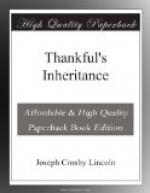“Now, Mrs. Barnes,” he begged, “I wish you would—that is, you know if you feel like it I—well, here I am. Can’t I do somethin’?”
Thankful turned and looked at him. She was torn between an intense desire to make a confidant of someone and her habitual tendency to keep her personal affairs to herself. The desire overcame the habit.
“Cap’n Bangs,” she said, suddenly, “I will tell you I’ve just got to tell somebody. If he was just writin’ to say he was all right and alive, I shouldn’t. I’d just be grateful and glad and say nothin’. But the poor thing is poverty-struck and friendless, or he says he is, and he wants money. And—and I haven’t got any money just now.”
“I have,” promptly. “Or, if I ain’t got enough with me I can get more. How much? Just you say how much you think he’ll need and I’ll have it for you inside of a couple of hours. If money’s all you want—why, that’s nothin’.”
Thankful heard little, apparently, of this prodigal offer. She took up the letter.
“Cap’n Bangs,” said she, “you remember I told you, one time when we were talkin’ together, that I had a brother—Jedediah, his name was—who used to live with me after my husband was drowned?”
“Yes. I remember. You said he’d run off to go gold-diggin’ in the Klondike or somewheres. You said he was dead.”
“I thought he must be. I gave him up long ago, because I was sartin sure if he wasn’t dead he’d have written me, askin’ me to let him come back. I knew he’d never be able to get along all by himself. But he isn’t dead. He’s alive and he’s written me now. Here’s his letter. Read it, please.”
The captain took the letter and slowly read it through. It was a rambling, incoherent epistle, full of smudges where words had been scratched out and rewritten, but a pitiful appeal nevertheless. Jedediah Cahoon had evidently had a hard time since the day when, after declaring his intention never to return until “loaded down with money,” he had closed the door of his sister’s house at South Middleboro and gone out into the snowstorm and the world. His letter contained few particulars. He had wandered far, even as far as his professed destination, the Klondike, but, wherever he had been, ill luck was there to meet him. He had earned a little money and lost it, earned a little more and lost that; had been in Nome and Vancouver and Portland and Seattle; had driven a street car in Tacoma.
I wrote you from Tacoma, Thankful [the letter said], after I lost that job, but you never answered. Now I am in ’Frisco and I am down and out. I ain’t got any good job and I don’t know where I will get one. I want to come home. Can’t I come? I am sorry I cleared out and left you the way I done, and if you will let me come back home again I will try to be a good brother to you. I will; honest. I won’t complain no more and I will split the kindling and everything. Please say I can come. Do please.




